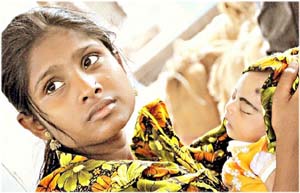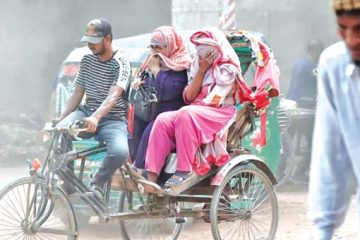Opinion
Zillur Rahaman
CHILD marriage is one of the social ills in Bangladesh. It was once an epidemic in Bangladesh. It, however, came under control because of various measures and the supervision of the government in the past decade or so, but has been increasing at an alarming rate since the Covid pandemic, which increased the poverty rate sharply. For girls in remote areas, this term is a dark chapter of horror. When many say it is a social curse, poor parents call it a social reality.
Bangladesh still has the highest rate of child marriage among Asian countries. A report by the United Nations Population Fund, released globally on April 19, says that almost 51 per cent of girls get married before the age of 18 in the country, which is a very alarming figure.
The report is based on data on child marriages from 2006 to 2022. According to the Bangladesh Demographic and Health Survey report, the child marriage rate was 59 per cent in 2017–18. The teenage pregnancy rate was 28 per cent in 2017–18, compared to 31 per cent in 2014. A BRAC survey found that child marriages increased by 68 per cent in the first 10 months of 2020 compared to the first 10 months of 2019. In fact, the latest report from the United Nations Population Fund has revealed the same alarming picture.
According to the report, the Maldives has the lowest rate of child marriage in South Asia — just 2 per cent. Apart from this, 10 per cent of child marriages are happening in Sri Lanka, 18 per cent in Pakistan, 23 per cent in India, 26 per cent in Bhutan, 28 per cent in Afghanistan, and 33 per cent in Nepal.
However, Bangladesh’s position has improved by one step in terms of child marriage around the world and now stands at fifth. Bangladesh was ranked sixth in last year’s report. In the new report, West African country Burkina Faso also ranks fifth, along with Bangladesh. Five other African countries occupy the top four positions. Niger has the highest rate of child marriage, at 76 per cent. The Central African Republic and Chad are joint second with a child marriage rate of 61 per cent. It is followed by Mali (54 per cent), Mozambique (53 per cent) and South Sudan (52 per cent). However, child marriage is completely absent in Singapore, South Korea, Finland, Norway, Belgium, Lithuania, the United Kingdom, and Northern Ireland.
Due to the Covid pandemic, the educational institutions were closed for a long time, and the students stayed away from school. Especially girl students stopped going to school. It was feared at the time that the delay in opening schools could exacerbate problems such as child marriage. Global statistics show that the number of child marriages increases during times of conflict, disaster or pandemic. Economists say that 20 per cent of people in Bangladesh lived below the poverty line before the pandemic, and another 23 per cent have fallen below the poverty line due to the pandemic. So the risk of child marriage increased a lot during this time. The government has also admitted that the situation of child marriage has worsened due to the pandemic.
The fact that the rate of child marriage has increased in the country during the pandemic has also been revealed by various surveys. According to a UNFPA survey report on child marriage, published in September 2022, the marriage rate of girls aged 15 to 19 in the country increased by 10 per cent in 2021 compared to the previous year.
According to the UNICEF report, strong steps need to be taken to stop child marriage in Bangladesh by 2030. It states that stopping child marriage is a priority for both the Bangladesh government and UNICEF. However, to achieve the Sustainable Development Goals (SDGs) to end child marriage by 2030 and the national target to end child marriage by 2041, Bangladesh needs to make further changes. To meet the national target, progress in ending child marriage needs to be at least 8 times faster than in the last decade and 17 times faster to meet the SDG targets.
Child marriages are violations of human rights and have devastating consequences for individuals and societies, robbing children of their childhood and limiting their opportunities to choose the life they want. Stakeholders must invest now to protect girls’ rights to survival and education and reduce their exposure to violence and abuse.
Among the reasons for child marriage are poverty, illiteracy, lack of awareness, prevailing customs and superstitions, social unrest, sexual harassment, a negative attitude towards girls, a lack of security, a deteriorating law and order situation, the dowry system, and a lack of proper laws related to the prevention of child marriage. Due to child marriage, childbearing at an immature age, an increase in maternal mortality rate, health loss, divorce, prostitution, and premature childbirth, women are subjected to various complications. However, public health experts say child marriage has a deep relationship with maternal mortality. Reproductive health is at risk if girls are married at an early age. For a long time, in our country, there has been no improvement in the situation of child marriage. It is not only poverty but also social behaviour that is responsible for this. It is still considered good to marry girls off at a young age. To prevent this situation, it is necessary to make education compulsory for girls up to high school, give stipends, and change the social attitude.
The Child Marriage Restraint Act of 1929 was converted into the Prevention of Child Marriage Act in 2017. In this act, the age of child marriage has been fixed in the definition of child marriage. However, the Bangladesh government has undertaken various awareness programmes against child marriage and is also doing extensive publicity in this regard. Mobile courts are being run by the local administration to stop child marriage. Various NGOs are also playing a complementary role. But in spite of this, the incidence of child marriage could not be effectively prevented. Many are registering child marriages by raising the age of minor boys and girls and showing fake birth registration certificates. Their argument is that they are forced to do these things in terms of reality to escape poverty or sexual harassment.
The government has to be proactive to deal with these emerging problems. Prevention of child marriage requires family and social values as well as awareness-raising and the progressive role of the educated population of the country. Not only the government but also the collective efforts of all can stop this dangerous rise of child marriage.
Md Zillur Rahaman is a banker and columnist.
– Article originally appeared on New Age.








